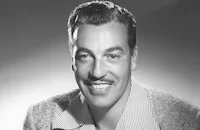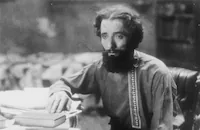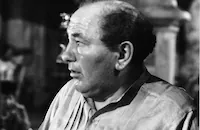Viva Cisco Kid
Brief Synopsis
Cast & Crew
Norman Foster
Cesar Romero
Jean Rogers
Chris-pin Martin
Minor Watson
Stanley Fields
Film Details
Technical Specs

Synopsis
In her upstairs room, Helena makes love to her sweetheart, the Cisco Kid, and after pledging her undying love, signals out the window with her handkerchief. Her mother rushes in to warn Cisco that American policemen are on the way. Knowing Helena has betrayed him, Cisco ties her up in the curtain and jumps out the window. Cisco learns that his cohort, Gordito, is getting married to the twice-widowed sister of Señor Pancho. Cisco breaks up the wedding by convincing Pancho that Gordito is another dying man. Out on the range, Cisco tells Gordito that they are adventurers, not the marrying kind, and pledges to give up women forever. Witnessing the holdup of a stagecoach, however, Cisco immediately falls for one of the passengers, Joan Allen. When the robbers fail to find the $25,000 the stage is supposedly carrying, they shoot the driver and prepare to rob and kill the passengers. Cisco and Gordito break up the holdup and take the stage safely into the town of Towash. In town, the express agent finds the money in a hidden compartment under the driver's seat. The robbers arrive at the "Garden of Eden" saloon, where they tell their leader, Hank Gunther, the bad news. After he finds out the money has actually arrived, Hank orders Jesse Allen, their inside man, to rob the express office that night. Jesse learns that his daughter Joan has arrived in town. Joan is taken to Jesse's home by Cisco, who agrees to dine with her that night. When Jesse arrives at home, he tells his daughter that he is no good for her, and then leaves for town when Cisco shows up for dinner. Cisco tells Joan that he has fallen in love with her, but as he is an outlaw, he must leave her before he hurts her. Cisco and Gordito agree to leave for Arizona the next day. Moses, a wandering preacher, sees Jesse hold up the express office. The posse takes out after Jesse, but he hears their hoof beats, and eludes them. Hank, realizing that Moses can identify Jesse, kills him that night. Jesse tells Joan what he has done and rides across the state border to Grande, agreeing to wait for her there. Cisco and Gordito run across Joan on their way to Grande, only to be captured by the posse. When Moses' murder is discovered, the posse wants to lynch the two men. They escape, with the posse in quick pursuit, leaving Joan with Hank and his henchmen. Hank takes Joan to the Sugar Loaf Mine, the Boss's hideout. The Boss, a practical joker, holds Joan hostage and sends Hank out to find Jesse. After escaping the posse, Cisco and Gordito are saved from arrest in Grande by Jesse. The three go to the mine to rescue Joan. Cisco and Gordito convince the Boss that they want to join his gang. They are about to rescue Joan when Hank arrives with the captured Jesse. The boss takes all four into the mine, placing them in a tunnel. The boss has his thug, Joshua, collapse the tunnel entrance, but the explosion collapses the mine as well, killing the entire gang. As they wait in the tunnel to die, Gordito finds a rabbit and uses it to locate a small hole to the outside. With dynamite, they then blast their way out of the mine. Jesse decides to return the money to Towash, and Joan kisses Cisco goodbye. As he and Cisco ride off, Gordito lights one of the Boss's trick cigars, which blows up in his face.

Director

Norman Foster
Cast

Cesar Romero

Jean Rogers
Chris-pin Martin

Minor Watson
Stanley Fields

Nigel De Brulier
Harold Goodwin
Francis Ford

Charles Judels
Harrison Greene
Leroy Mason
Tom London
Jim Mason
Hank Worden
Eddy Waller

Ray Teal
Bud Osborne
Paul Sutton

Mantan Moreland
Paul Kruger
Willie Fung
Frank Darien
Jacqueline Dalya
Margaret Martin
Inez Palange
Crew
Fred Allen
William H. Anderson
Charles [g.] Clarke
Norman Colbert
Richard Day
Samuel G. Engel
Bernard Freericks
Chester Gore
Herschel
Frances Hyland
Samuel Kaylin
William Koenig
Thomas Little
Hal Long
Sam Schneider
Saul Wurtzel
Sol M. Wurtzel

Film Details
Technical Specs

Quotes
Trivia
Notes
The working titles for this film were Romance in New York, The Cisco Kid in New York, Romance in Chicago, The Cisco Kid in Chicago, and Cisco Kid No. 2. Materials found in the the Twentieth Century-Fox Produced Script Collection at the UCLA Theater Arts Library demonstrate that the original concept for this film included taking the Cisco Kid to either New York or Chicago. This work, done in the outline and treatment stages by writers M. M. Musselman and Leonard Hoffman, was rejected and the final product was created by the credited writers Samuel G. Engel and Hal Long. In a Hollywood Reporter production chart, Fred Allen was listed as the film editor and Sam Schneider was listed as the assistant director, but their participation in the final film has not been confirmed. Hollywood Reporter also reported that studio filming ended January 2, 1940, with the cast and crew then moving to Sedonia Basin, Arizona for two weeks of location shooting. According to a New York Times article, John Igual de Montijo filed suit against a number of film companies, including Twentieth Century-Fox, arguing that his work "Viva Madero" was plagiarized by Paramount's Northwest Mounted Police and Viva Cisco Kid. According to Twentieth Century-Fox legal records, the lawsuit was dismissed in September 1941. For more information on the Cisco Kid series, see the entry above for The Cisco Kid and consult the Series Index.












